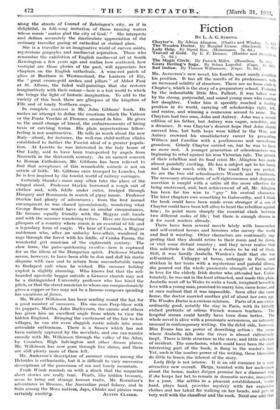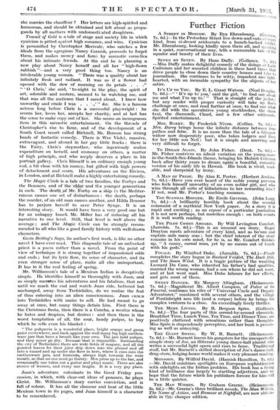Fiction
By L. A. G. STRONG.
7s. 6d.)
MR. ALINGTON'S new novel, his fourth, must surely establish his pOsition. It has all the merits of its predecessors, with an increased solidity of structure. There are no loose ends in Chaytor's, which is the story of a preparatory school. Founded by the indomitable little Mrs. Pallent, it was taken over by the strong, purposeful, and sound young man who married her daughter.: Under him it speedily reached a leading position in its world, carrying off scholarships right, left, and centre, and winning a connexion second to none. The Chaytors had two sons, John and Aubrey. John was a second edition of his father, but Aubrey was vague, sensitive, and a dreamer. It was Chaytor's dearest hope that John should succeed him, but both boys were killed In the War, and Aubrey crowned his unsatisfactory career by presenting William and Caroline with a posthumous and unwelcome grandson. Grimly Chaytor carried on, but he was to have no more rest. A younger generation of schoolmasters was beginning to rebel against his iron Victorian rule. The growth of their rebellion and its final crisis Mr. Alington has made almost painfully exciting. He has a subject apt to his hand, and has done much with it. The small boys are perfect. So are the two old schoolmasters Wrench and Tomlinson. The necessary atmosphere of self-righteousness and dogmatic assertion is caught with a satire all the more effective for being unstressed, and, best achievement of all, Mr. Alington has been far too wise to " guy " his central character. The later chapters owe something to Galsworthy, and I think the book could have been made even stronger if a son of Chaytor could have been left alive to head the rebellion against him ; to point more sharply the essential clash between two different codes of life ; but there is enough drama in it for most readers already.
There have been several novels lately with humourless and self-centred heroes and heroines who survey the world and find it wanting. Other characters are continually sug- gesting that they should retire to their room and lie down, or visit some distant country ; and they never realise that this solicitude is due simply to a desire to be rid of them. Still, it was hardly Arabella Warden's fault that she was self-centred. Unhappy at home, unhappy in Paris, and stricken in her teens with a mysterious and painful illness, ahe poured out the whole passionate strength of her nature in love for the elderly Irish doctor who attended her. Unfor- tunately, he was npt in the least attracted, and made this plain. Arabella went off to Wales to write a bOok, imagined herself in love with a young man, promised to marry him, came home, and at once realised that it was impossible. Soon after she came home, the doctor married another girl of about her own age. The Wooden Doctor is aeurious mixture. Parts of it are extra- ordinarily good, notably the stay in Paris, with its bitterly etched portraits of odious French women teachers. The hospital scenes could hardly have been done better. The whole novel is alive with a passionate seriousness, an intensity unusual in contemporary writing. On the debit side, however, Miss Evans has no power of describing action : the scene where Arabella falls into the river is almost ridiculously inept. There is little structure in the story, and little selection of incident. The conclusion, which could have been the most interesting part of the book, is flung in the reader's face. Yet, such is the sombre power-of the writing, these blemishes do little to lessen the interest of the story.
Lady Help is not intense. It is an old romance in a very attractive new overall. Helga, taunted with her uselessness about the house, makes Jurgen promise her a diamond ring if she keeps her bet to remain in domestic service, incognito, for a year. She settles in a pleasant establishment, works hard, plays hard, provides mystery with her expensive clothes and her talent for walking on her hands, and gets on very well with the chauffeur and the cook. Need one add that
she marries the chauffeur Y Her letters are high-spirited and humorous, and should be obtained and left about as propa- ganda by all mothers with undomesticated daughters.
Travail of Gold is a tale of stage and society life in which cynicism is pitted against high romance, and wins. Cynicism
is personified by Christopher Merivale, who catches a few ideals from the egregious Nancy Cornish, proceeds to forget them, and makes money and fame. by sarcastic comedies
about his intimate friends. At the end he is planning a
new play about Nancy herself and all her " high-flown rubbish "—and a very good thing too. Nancy is an intolerable young woman. " There was a quality about her infinitely fresh and radiant. It was as if a flower had opened with the dew of morning on its petals . . ."
" 0 Chris,' she said, ' to-night in the play, the spirit of art, adorable and austere, seemed to be watching me, and that was all the audience that I cared about. I knew how
unworthy and crude I was . . " &c. She is a famous actress long before Chris is a successful playwright : he
scorns her, loves her, accepts her charity, and at last has the sense to make copy out of her. She seems an incongruous item in this sarcastic entertainment. On the threads of Christopher's rise to fame, and of the development of a
South Coast resort called Bicknell, Mr. Benson has strung beads of fantastic comedy. There is Wee Violet, massive, extravagant, and absurd in her gay little frocks : there is the Fairy, Chris's stepmother, who ingeniously makes expenditure on herself, and economy on others, a matter of high principle, and who amply deserves a place in his portrait gallery. Chris himself is an ordinary enough young cad, a bit close with his money, but gifted-with high powers of dctaclunent and .scorn. His adventures on the Riviera, in London, and at Bicknell make a highly entertaining comedy.
The Magic Circle is .a tale of two families, the Forbys and the Beamers, and of the oldep and tr. e younger generations in each. The death pf Mr. Forby on a ship in the Mediter- - ranean causes one set of disturbances : the death, perhaps the murder, of an old man causes another, and Hilda Beamer has to perjure herself to save Peter Synge. It is an interesting story. It would have been a very good one but far an unhappy knack Mr. Miller has of reducing all his narrative to one level. Still, that level is well above the average ; and The Magic Circle can be strongly recom- mended to all who like a good family history with well-drawn characters.
'Costa Berling's Saga, its author's first work, is like no other novel I have ever read. This rhapsodic tale of an unfrocked priest is a poem rather than a novel. From the point of view of technique it is strung together of impassioned odds and ends ; but its lyric flow, its sense of character, and its even stronger sense of place, make all else unimportant. It has in it the real feeling of spring.
Mr. Williamson's tale of a Mexican Indian is deceptively simple. He identifies himself so thoroughly with Juan, and so simply narrates his adventures and his fatalism, that not until we reach, the cud and watch Juan ride, battered but unchanged, away from Techichilco, do we realize the feat of thus entering into an alien consciousness. Juan coal into Techichilco with maize to sell. He had meant to go away at once, but many things detain him. First there is the Christmas fiesta, then there is a Concha, a mestizo whom he hates and despises, but desires : and then there is the worst temptation of all, the sour, heady pulque, to buy which he sells even his blanket : " The pulqueria is a wonderful place, bright orange and green paint everywhere, and back against the wall many big high earthen- ware jars that have a breath like your own. The jars hold pulque, and they never go dry. Because that is impossible. Surrounding the city of Techichilco there are wide fields of maguey, and all the pointed leaves let their juice drip down into the ground and off into a tunnel and up under the floor in here, where it rises into the earthenware jars, and ferments, always high towards the wide mouth, so that no one need go thirsty. Men press up to the bar, and occasionally one takes out a guitar and plays music. There are also stories of women, and every one laughs. It is a very gay place.
Juan's adventure culminate in the Good Friday pro- cession, in which, with clear-cut ideas of penance, he plays Christ. Mr. Williamson's story carries conviction, and is full of colour. It has all the clamour and heat of the little Mexican town in its pages, and Juan himself is a character to be remembered.









































 Previous page
Previous page